MightyGanesha.com

TheDivaReview.com

Hey boys and girls, hold on to your fezzes for this one. We were so privileged to meet one of the last remaining Hollywood legends in the form of one Dennis Lee Hopper. A resumé too long to preface here, this icon sat down to chat along with the luminous Patricia Clarkson and director Isabel Coixet to discuss their latest effort Elegy. Sit in as we bask in the glow of tales of James Dean, stripteases Easy Rider, fetish objects and how to create the perfect Cineplex.
Elegy
Patricia Clarkson and Director Isabel Coixet
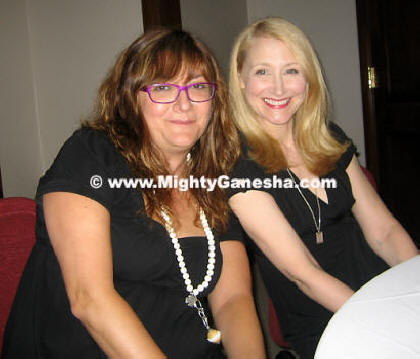 Mighty
Ganesha: Patricia, right off the bat, I must say your striptease
in the scene was absolutely stunning.
Mighty
Ganesha: Patricia, right off the bat, I must say your striptease
in the scene was absolutely stunning.
Patricia Clarkson: {Laughs}
Isabel Croixet: {Laughs} Let’s talk!
MG: Was there any hesitation on your part when you read that scene?
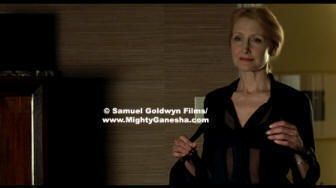 PC:
Oh, no!
Oh, no no no no! I loved the striptease! I
wanted
that striptease! I was hoping it wasn’t going to go away. Because
sometimes those kind of moments, when you’re not the main character,
it’s like, ‘Oh. why do we need to see this woman strip?’ I know it was
fun. And what was great is it was left loose and easy – well, that’s how
Isabel shoots, which is so dreamy. So she was like “Yeah, come on in.”
Yeah, we just went. {Starts
laughing} She put the
music on, Ben fell on the bed and whoo!
PC:
Oh, no!
Oh, no no no no! I loved the striptease! I
wanted
that striptease! I was hoping it wasn’t going to go away. Because
sometimes those kind of moments, when you’re not the main character,
it’s like, ‘Oh. why do we need to see this woman strip?’ I know it was
fun. And what was great is it was left loose and easy – well, that’s how
Isabel shoots, which is so dreamy. So she was like “Yeah, come on in.”
Yeah, we just went. {Starts
laughing} She put the
music on, Ben fell on the bed and whoo!
Q: How would you describe Carol?
PC: I think she’s met her match with Ben, a fellow hedonist. I mean, they’re two peas in a pod. They are two people who have a certain way of life. They have a certain companionship that suits them perfectly. And I think there are people who are not looking to be bogged down.
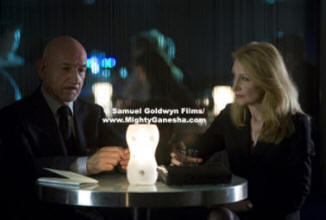 Q: Yet
Carol gets upset when Ben’s character is seeing someone else.
Q: Yet
Carol gets upset when Ben’s character is seeing someone else.
PC: She’s upset because it’s always as free as you are, it’s still difficult. And also they have a certain amount of honesty that I think she says, you know that’s the beauty of our relationship is we don’t have to lie to one another; we don’t have to sneak around. I’m not saying that in the twenty years they were together didn’t probably stray but I think they were honest. And I think it’s his dishonesty that is… you know.
Q: Did you read the original novel, The Dying Animal, by Philip Roth before the film came to you?
PC: Yes, I did, yeah.
IC: I read it when it came out six years ago, and I thought, ‘Well, some filmmaker will do this movie.’ I didn’t it was going to be me. I think Nicholas Meyer did a really smart, really intelligent adaptation.
MG: Did you have the instant yes from the rest of the cast as you did from Patricia?
IC: Yeah!
{Both laugh}
PC: You know as actors, it’s a club, but there are actor’s directors. The directors that we want to work with and Isabel is at the top of the list. There isn’t an actor alive, who doesn’t want to work with her, I’m not kidding you. She’s actor-friendly, to put it in base terms, but she is.
MG: Will you tell us what it was like to work with the rest of the cast?
 IC:
Well, Penelope (Cruz)
was attached from the moment Lakeshore bought the rights of the novel.
She has been in this project, I think for five years. And she was the
one who to tell me about Elegy and “Do you think you’re gonna like to
direct a film in the States?” And since I read The Dying Animal I was
like, “Oh, I dunno, I think it’s very risky and it’s very challenging.
I’m scared to do it,” and so, I said yes. Then I went to LA and I spoke
with Ben, and basically we spoke about love, death, all the women in his
life. He said “Gandhi was a really easy role for me, but David Kapesh is
not, because David Kapesh is close to me, and it’s much easier to play
someone who’s really, really far away like Gandhi.” And then I remember
the first time I read the script, the first person I thought in the
first scene was Patricia, because I am a big fan of hers and I think she
is amazing. If you write a chair in a script, I think she can play a
chair…
IC:
Well, Penelope (Cruz)
was attached from the moment Lakeshore bought the rights of the novel.
She has been in this project, I think for five years. And she was the
one who to tell me about Elegy and “Do you think you’re gonna like to
direct a film in the States?” And since I read The Dying Animal I was
like, “Oh, I dunno, I think it’s very risky and it’s very challenging.
I’m scared to do it,” and so, I said yes. Then I went to LA and I spoke
with Ben, and basically we spoke about love, death, all the women in his
life. He said “Gandhi was a really easy role for me, but David Kapesh is
not, because David Kapesh is close to me, and it’s much easier to play
someone who’s really, really far away like Gandhi.” And then I remember
the first time I read the script, the first person I thought in the
first scene was Patricia, because I am a big fan of hers and I think she
is amazing. If you write a chair in a script, I think she can play a
chair…
PC: {Laughs} That’s my next project!
IC: It’s a very experimental film, she plays a chair.
But with all the actors, even Dennis Hopper I think {he) was the first person I thought of and Peter {Sarsgaard), too.
PC: Yeah, we were all her first thoughts.
IC: Yeah, I know it’s kind of difficult to believe, but it’s true. And Peter, I think he does a very, very difficult thing because he plays an asshole, and I think it’s very difficult and I think he does it really well.
PC: Ohh, he’s fantastic!
IC: And I don’t know, when Patricia said I’m actor-friendly, it’s just I love actors. I think part of the blessing to be a director is just to be there to see how the characters grow up and they become human beings, and for me, human beings who are bigger than life. And really, it was a pleasure to wake up every morning to go to the set and to work with them. I’m not saying that it was a really easy job, no, but really, all the actors were amazing. All of them were there for me and for the story and it was really good.
MG: I wanted to ask about the cinematography on the film and how closely you worked with your director of photography? The close-ups on both Patricia and Penelope are stunning.
PC: They are beautiful. Her DP is amazing!
 MG:
Penelope is filmed so lovingly that she doesn’t even look real. She’s
almost like a fetish object and I wondered if that was your point in
filming her that way? To further the point that to Kapesh, she is a
fetish object?
MG:
Penelope is filmed so lovingly that she doesn’t even look real. She’s
almost like a fetish object and I wondered if that was your point in
filming her that way? To further the point that to Kapesh, she is a
fetish object?
IC: Yeah, but I think she’s flattered by that. I mean she is an object, but there is a moment when she really enjoys being one. When that object is broken is when life begins, the big issues of life. Jean-Claude Larrieu is the DP I worked with in my last four films, he’s a wonderful DP. I operate the camera and he does the lighting and I think we’ve worked together for the last twenty years and we never talk about lighting. We talk about, ‘Okay, what’s the important thing in that scene?’ What we want the audience to feel. He’s wonderful.
MG: Did he also take the beautiful still photos of Penelope?
IC: Yes!
Q: What do you have coming up next?
PC: Let’s see, I just did some movies back-to-back. I just worked with Woody Allen again. I have a movie coming out soon, Vicky Christina {Barcelona}, but I worked with him again with Larry David. And then I worked with Marty Scorsese. And I did a movie in Egypt, that’s gorgeous and I’m the lead of the film which is rare, as you know. But it’s a beautiful film I did with Alexander Siddig. So I’m actually now just taking a nice long break. I’m sitting in my apartment and kissing my dog!
MG: Well, it seems like good things happen in twos for you, because you’ve got two Woody Allens {Vicky Christina Barcelona and Whatever Works}, two films with Penelope Cruz {Elegy and Vicky Christina Barcelona} and two films with Ben Kingsley {Elegy and Shutter Island}!
PC: Yes it’s a weird thing, and maybe there’ll be two Isabels. I’m banking on that!
MG: And what’s next for you, Isabel?
IC: I’m going to make a film in Tokyo.
PC: In Japanese!
IC: It’s a film called Map of the Sounds of Tokyo and it’s about a contract killer.
MG: Do you have a cast?
IC: It’s a totally Japanese cast except two actors.
MG: Who’s the star?
IC: Rinko Kikuchi.
Dennis Hopper
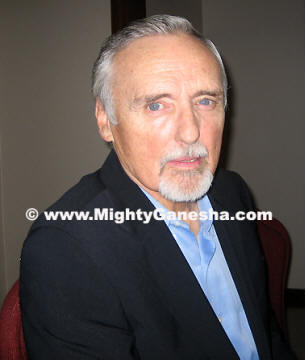 Mighty
Ganesha: Did you ever have a friend like George, your character in
Elegy? Like a bad angel on your shoulder?
Mighty
Ganesha: Did you ever have a friend like George, your character in
Elegy? Like a bad angel on your shoulder?
Dennis Hopper: {Laughs} A bad angel on my shoulder? George makes a lot of sense to some of us males. {Laughs} Yeah, probably.
MG: Did you ever listen to those friends?
DH: Probably not at all.
Q: What attracted you to come to Elegy?
DH: Well, the cast, and when I heard that Sir Ben Kingsley and Penelope Cruz were already doing it that even before I read the script that I think I should take this job {Laughs}. Then when I read the script it was this wonderful, wonderful part and it was a no-brainer to take this one.
MG: There is a climatic moment between George and Ben and I wondered how much of that scene was scripted. It flowed very naturally and was very spontaneous…
DH: Cos it’s such good acting! {Laughs}
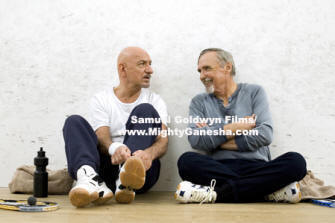 MG:
Were you allowed to improvise that scene at all?
MG:
Were you allowed to improvise that scene at all?
DH: No, it was all written. From my part, there was no improvisation at all. I didn’t improvise even one word.
MG: Were you allowed to if you felt like the scene merited that?
DH: Oh, probably, but I didn’t see any necessity to. First of all, most of my scenes, almost all of them except with Debbie Harry were with Sir Ben, and it’s just such a pleasure to work with an actor as generous as he is, first of all, as an actor. But to do a moment to moment reality with him is so wonderful because you go here, he goes with you. I mean, it’s just a give and take. And he’s so honest it’s just impossible to lie to him, or you can know that you’re acting immediately.
Q: Your chemistry together is so great; did you know each other well off screen before shooting the film?
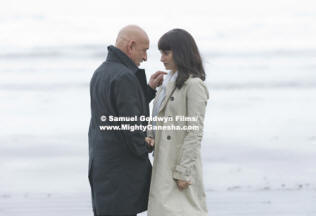 DH:
We’d only met a couple times just to say hello. I met him after Gandhi
and just at parties or whatever. We really didn’t know each other at
all. I’d met Penelope, I was president of the Venice Film Festival and
Bigas Luna, a director from Barcelona had a film called Jamon, Jamon
which starred Penelope and Javier Bardem and I gave it the Silver Lion.
So that’s when I first met Penelope, I think she was eighteen, I think
Javier was nineteen, and now they’re together, isn’t that wonderful?
Which is cool. So, I was aware of her. But when I saw this film, very
honestly, I mean, I love this film. I don’t have to jive this film, I
really do, I really like it. I love my performance in it, but I think
Sir Ben and Penelope are just incredible in it. And she is amazing, for
the first time I really looked at her as a woman and she’s like a Sophia
Loren. She’s like this earth mother suddenly that really has power. I
just was really impressed with her when I saw the film.
DH:
We’d only met a couple times just to say hello. I met him after Gandhi
and just at parties or whatever. We really didn’t know each other at
all. I’d met Penelope, I was president of the Venice Film Festival and
Bigas Luna, a director from Barcelona had a film called Jamon, Jamon
which starred Penelope and Javier Bardem and I gave it the Silver Lion.
So that’s when I first met Penelope, I think she was eighteen, I think
Javier was nineteen, and now they’re together, isn’t that wonderful?
Which is cool. So, I was aware of her. But when I saw this film, very
honestly, I mean, I love this film. I don’t have to jive this film, I
really do, I really like it. I love my performance in it, but I think
Sir Ben and Penelope are just incredible in it. And she is amazing, for
the first time I really looked at her as a woman and she’s like a Sophia
Loren. She’s like this earth mother suddenly that really has power. I
just was really impressed with her when I saw the film.
MG: What’s interesting is the film spends so much time setting her up as this sex object.
DH: Yeah, and then it tears it all down. It’s what’s so great.
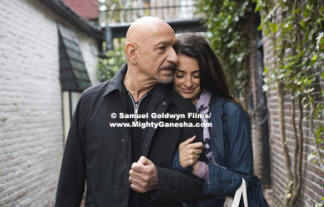 Q: Do
you find the line that George speaks in the film, “Beautiful women are
invisible; we're so dazzled by the outside that we never make it
inside.” To be true?
Q: Do
you find the line that George speaks in the film, “Beautiful women are
invisible; we're so dazzled by the outside that we never make it
inside.” To be true?
DH: Absolutely true. Yeah, I mean I’m dazzled by beauty; I don’t even try to get inside. Let’s see, how are we saying this {Laughs} No, I’m dazzled by physical beauty.
Q: As an actor, you’re surrounded by attractive people.
DH: That’s right. You can be dazzled every minute! {Laughs}
Q: Next year is the fortieth anniversary of Easy Rider.
DH: Wow, I was eight years old when we made that. Forty years, wow.
Q: That movie sent a lot of young talent out to Hollywood.
DH: For a moment, yeah. Too bad they weren’t as talented as I am {Laughs}
Q: There were a lot of innovations in Easy Rider that we take for granted now.
DH: Yeah, that was the first time found music was ever used rather than writing a score for the movie. And everybody confused it being a bike movie; I always thought it more as a western. I thought, ‘Well, we’re riding motorcycles, but we could be riding horses,’ and we‘re outside camping and all the people in town are leery of these bikers, these outlaws coming through on their motorcycles, horses, whatever. And also, it was a lot about what was happening in the country at the time, cos it was 1968, the riots were going on, cities were burning down, the Black Panthers had erupted and everybody was trying to stop the war, it was really a nightmare. And the symbolism of putting all the money – I mean, if you think about it now, it really is prophetic – putting all the money into the beautiful chrome machine with the American flag on it. Putting all the money in the gas tank and then it blowing up by the side of the road, I mean, hello? So, that all worked out, but I’m very proud of that movie.
Q: Are there plans for Paramount to reissue the film for its fortieth anniversary?
DH: No, they don’t reissue anything, unfortunately in Hollywood. They gave up reissuing. They used to reissue Gone With the Wind, didn’t they? I think that’s gone, too. We have no history anymore, we’re just, what’s the next weekend box office gonna be like, and that’s unfortunate. I think that when people make a Cineplex, it would be wonderful if you built ten theatres, you can have seven of them for your big Hollywood blockbusters and have one for independent films, one for foreign films, and one for the history of film. So that the younger people can have some sort of idea of where these films came from and to be able to see foreign films, like when I was a young guy – even though I was working in Hollywood, doing Rebel Without a Cause at eighteen with James Dean, and Giant and so on - we were going to see foreign films. In Los Angeles at that time, there were at least five or six theatres that we could see foreign films, we called them art houses. Those don’t exist anymore. I mean in New York you can probably get them, yeah, but the rest of the country is starving for any kind of information. So, I think that would be a wonderful way to go. I bet you that after a year that those three theatres would have lines going to them and the others would still be a gamble. I just think because of the snob appeal and the very intellectual idea that, y’know, when I was a young man, you couldn’t get laid unless you had an existentialist book under your arm. {Laughs} So, this would add onto that kind of idea.
Q: You mentioned James Dean a moment ago; can you talk about the effect meeting him and working with him had on your career?
DH: Well, it was pivotal moment, because I came out of playing Shakespeare out of the old Globe theatre in San Diego, and I was eighteen years old and I went under contract to Warner Brothers. And I came on the set and I met James Dean and we started working together and suddenly – I’d never seen improvisation before, I mean I was doing line readings and doing gestures and doing preconceived ideas, everything was preconceived - and suddenly I see this guy doing all these incredible things and none of it is on the page. I’m thinking, ‘Where’s he coming from?’ ‘Where’s he getting all these ideas for these things?’ I’d never seen improvisation. I knew nothing about method acting. I’d seen Marlon Brando act, I’d seen Montgomery Clift act, but I wasn’t aware of what method was or any of that. And so being eighteen, it was an incredible moment for me to see this and then later I went and studied for five years at Strasberg. But that was an incredible moment and he is still, in my mind, the best actor I ever saw. I’ve never seen anybody as good as him.
 Q: If
you had to choose some films for that movie theatre you wanted, which
would be some of the quintessential films for people to see to
demonstrate the history of film?
Q: If
you had to choose some films for that movie theatre you wanted, which
would be some of the quintessential films for people to see to
demonstrate the history of film?
DH: Well I mean certainly Citizen Kane, Treasure of the Sierra Madre, 400 Blows, Seventh Seal. It gets tough; you gotta go with Kurosawa, De Sica.
MG: Talking of Kurosawa, I spoke with Tatsuya Nakadai and he and his Kurosawa costar Toshiro Mifune had a very commanding stage presence that was very similar to yourself or Brando or Dean or Clift, that he said he no longer saw in any of the young Japanese actors. Do you see any actors currently who also have that sort of presence?
DH: I think there’s a lot of really incredible actors these days. You know, we’ve come a long way when in the old days when I used to have to fight to block my own scenes and used to have to fight to not get line readings from the directors, and just fight about everything. Cos you had to pick up the cup at a certain time and put it down, you had all these preconceived ideas, which in method acting is death. Like they say, you do this in your golf swing, it’s death. {Laughs} Well, it’s certain things, like preconceived ideas and so on, to live in moment to moment reality are not happening. But, I mean, look at Meryl Streep’s work, Meryl Streep is an incredible actress. There’s just so many really wonderful young actors and young actresses. I think that acting is very healthy in America. Directing, I think, is a little behind. And movies made by committee … psh. I still think the director should be the one. Hopefully, the director also wrote it, or was involved in writing of the screenplay so you have an auteur filmmaker who’s making the film and then the rest falls into place. But the acting, I think our acting and our actors have really improved a lot.
Q: As much money is poured into a Hollywood film produced by a major studio these days, it’s almost impossible to expect to give a director free rein over any project.
DH: It’s impossible because they’re a bunch of idiots. I mean when we made Easy Rider, Bert Schneider, who made Five Easy Pieces and The Monkees and so on who was Bob Rafelson’s partner, and whose father was Abe Schneider, who was the president of Columbia Pictures. I mean, Easy Rider would never have been seen by anybody if I’d just went out and made an independent film for $320,000, no one would’ve seen it. Abe Schneider had to pay off the unions to get it to be shown and it was the first time and independent film was shown by a major company.
I mean the idea of a committee thing, they should pick the director, they should pick it on that level and let him make his film. I mean Schneider would say – I’d say “You know, I want you to see dailies,” he’d say, “I don’t want to see anything. You bring me your first cut.” Now, that’s a producer! That’s a producer that believes in you and lets you go. And he did that with all his films at BBS, Five Easy Pieces all of them were made that way. And The Last Picture Show - Bogdanovich - was also made that way.
Q: Which auteur directors would you like to work with that you haven’t?
DH: I think our main auteur is Woody Allen. I mean, he writes and produces and directs his films - certainly he’s one of the best. Oliver Stone, even though he gets confused a little on history at time, is certainly a marvellous filmmaker. He also is a writer-director. There just aren’t that many when you really think about it.
MG: Finally, on another project, you look like you’re having the best time in Hell Ride.
DH: Did you see it? It’s so much fun, isn’t it? Larry did a great job, Larry Bishop. You know he’s Joey Bishop’s son! And Tarantino, it was such a fun time. Its fun!
~ Mighty Ganesha
August 4th, 2008
© 2006-2022 The Diva Review.com